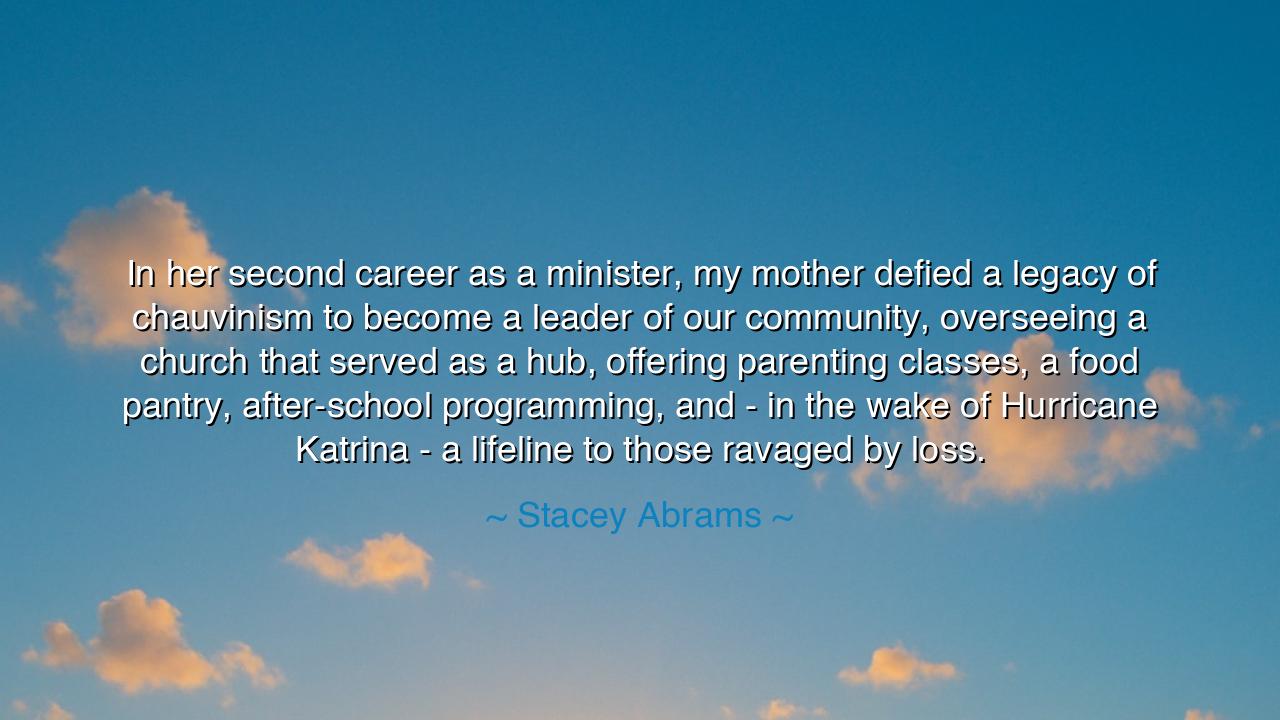
In her second career as a minister, my mother defied a legacy of
In her second career as a minister, my mother defied a legacy of chauvinism to become a leader of our community, overseeing a church that served as a hub, offering parenting classes, a food pantry, after-school programming, and - in the wake of Hurricane Katrina - a lifeline to those ravaged by loss.






The words of Stacey Abrams rise like a hymn of gratitude and remembrance: “In her second career as a minister, my mother defied a legacy of chauvinism to become a leader of our community, overseeing a church that served as a hub, offering parenting classes, a food pantry, after-school programming, and—in the wake of Hurricane Katrina—a lifeline to those ravaged by loss.” These words carry the weight of history and the light of triumph. They remind us that strength is not always born in the halls of power, but often in the hearts of women who dared to lead when the world told them to be silent.
Abrams tells of a mother who shattered the chains of chauvinism, a force as ancient as time itself, which sought to keep women silent, unseen, and confined. In her rise as a minister, she did not merely claim a title; she claimed space for every woman who had been told her voice was unworthy of the pulpit. In this act, she joined the long line of heroines who defied the world’s narrow expectations—Deborah of Israel, who judged her people with wisdom; Hilda of Whitby, who guided kings and scholars; and Sojourner Truth, who thundered against injustice with the fire of the Spirit.
Her ministry, as Abrams recalls, was not of empty words but of deeds that nourished the body and spirit alike. The church became a hub, not just for worship but for life. There were parenting classes to strengthen families, food pantries to feed the hungry, after-school programs to guide the young, and, in the time of disaster, a lifeline for those torn by the storm of Hurricane Katrina. Here, the church returned to its ancient calling: not a house of stone alone, but a refuge, a fortress for the weary, a beacon of light in the darkest hour.
Consider how in the days after the fall of Rome, when cities lay in ruin, it was monasteries and convents—often led by women of unshakable will—that became centers of care, education, and healing. What Abrams describes echoes that ancient legacy: when governments falter and storms of history rage, it is often the faithful and the courageous who rise to hold together the fabric of community. Her mother’s leadership is one such testimony, proving again that true power is not domination, but service.
The lesson here is profound: greatness does not always wear the crown of rulers; it often wears the apron of service, the robe of ministry, the hands that build shelters and pass out food. To defy chauvinism is not merely to claim equality, but to show that women can lead communities into survival and flourishing, carrying burdens that others could not. In this way, Abrams’s mother is not only her parent but also a model for all who would rise against injustice and serve with courage.
For us, the teaching is clear: when life offers the chance to lead, lead with both strength and compassion. When the world seeks to limit you, rise above with courage and persistence. When disaster strikes your neighbor, do not wait for orders from the powerful—become the lifeline with your own hands, your own heart, your own resources. For the strength of a community is not in wealth or status, but in the willingness of its people to serve one another.
Practically, this means building communities where care is central. Support parents by sharing wisdom and encouragement. Give your time to feeding the hungry, teaching the young, and comforting the grieving. Refuse to let prejudice or chauvinism silence you or others—honor the voices that history once sought to bury. In every act of service, you carry forward the legacy of leaders like Abrams’s mother, who turned a church into a fortress of love and resilience.
Thus, Stacey Abrams’s words must be remembered not only as the story of one woman, but as a call to all generations: defy the chains of injustice, and build sanctuaries of hope. For in the courage of such leaders, families are strengthened, the hungry are fed, and even in the aftermath of storm and ruin, life itself rises again.






AAdministratorAdministrator
Welcome, honored guests. Please leave a comment, we will respond soon